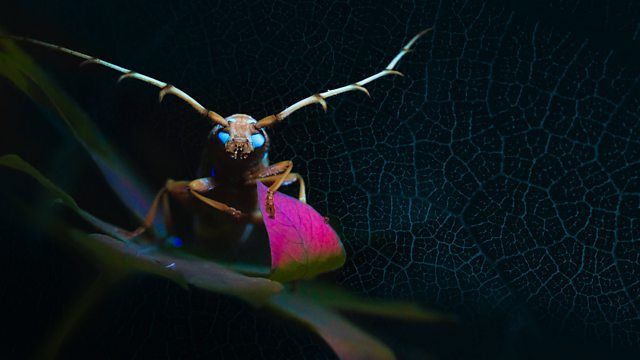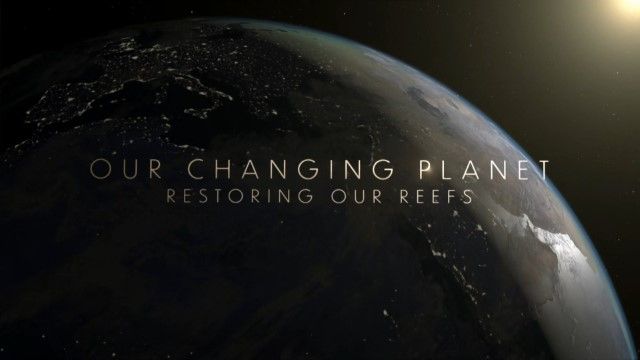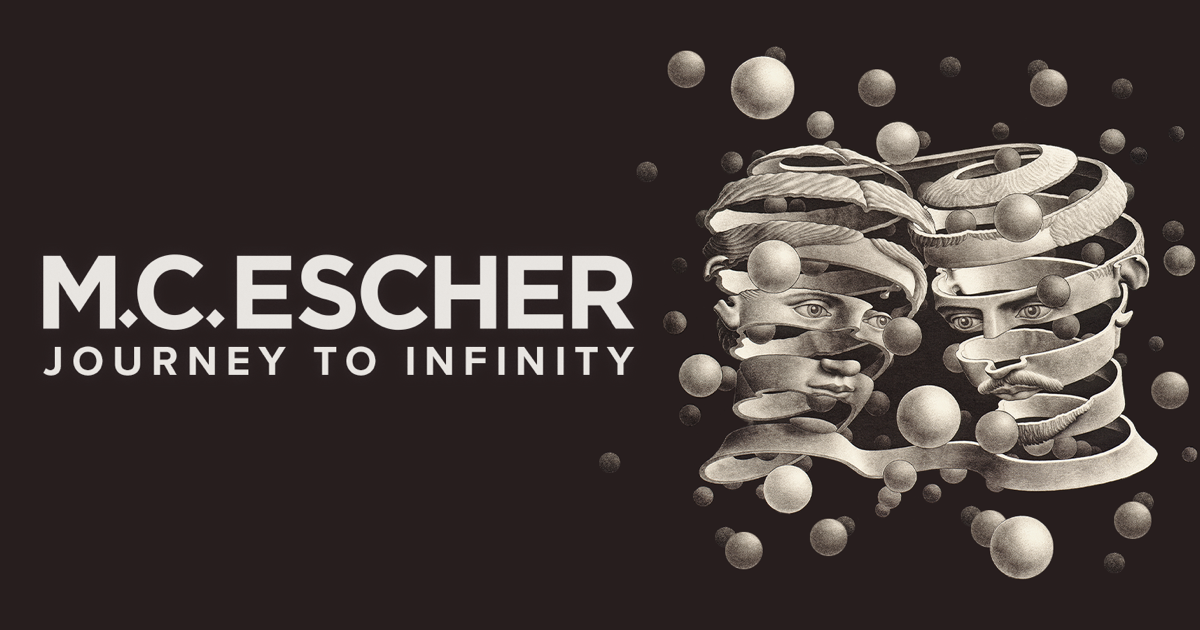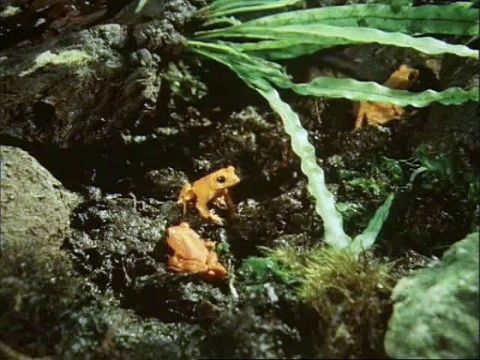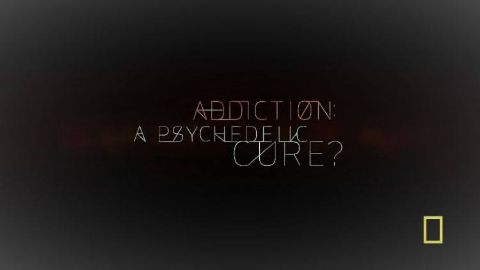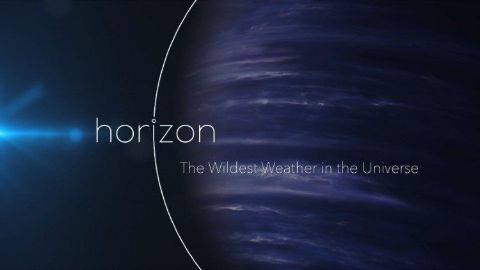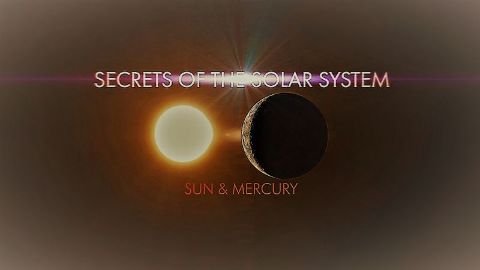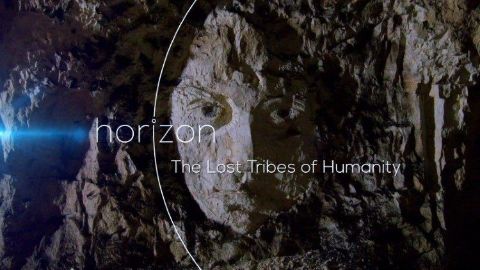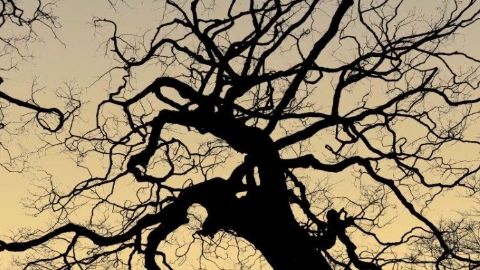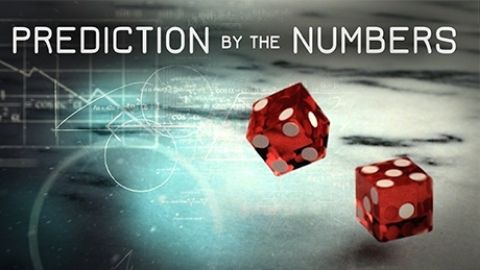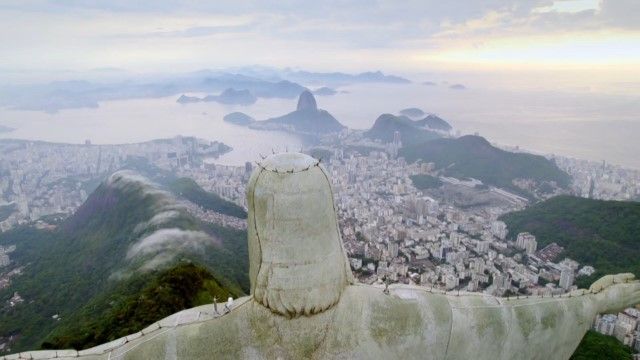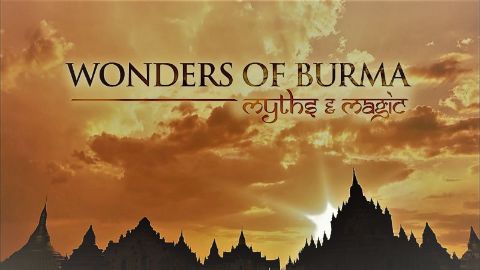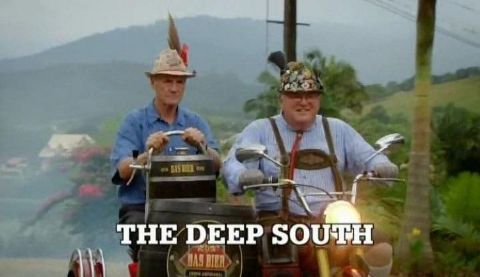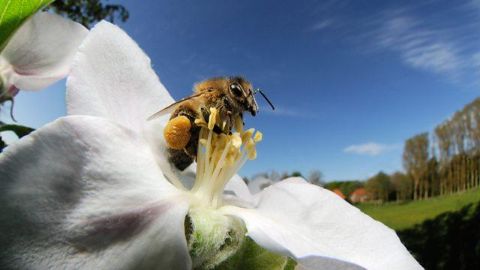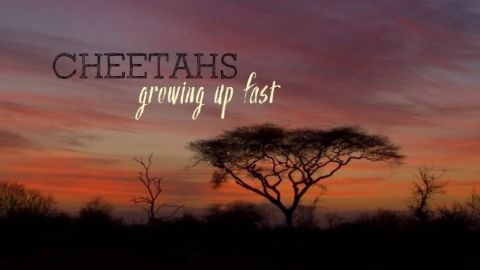Latest Documentaries
The culture of Japan is incredible, from bloom festivals to ultra-modern cities. But there are also more than 130 mammals and 600 bird species dwelling in Japan’s 6,852 islands. This island chain is long enough to span climate zones, providing a huge range of habitat.
2020 • Nature
Exploring the realm of the creatures to better understand how they have evolved. Travelling from the rain forests of French Guiana to the Arctic Ocean, scientists use traditional and cutting edge techniques to examine both modern insects and the fossil record in their search for a single common insect ancestor.
2024 • Nature
David Attenborough reveals why forests are the ultimate test of survival for mammals, including a tiger whose stealth and hunting strategies are put to the test in the heat of an Indian summer. The programme also features footage of young chimpanzees learning how to get honey without angering bees and Siberian flying squirrel gliding elegantly and effortlessly from tree to tree.
S1E6 • Mammals with David Attenborough • 2024 • Nature
David Attenborough reveals how, by pushing themselves and their bodies to the limit, mammals have found remarkable ways to survive in the hottest places on earth. In South America, thirsty capuchins need all their natural curiosity as they search for water on the forest floor. Camels roam the vast outback of Australia, where they can go for weeks without water thanks to their distinctive hump as an energy store. White sifaka lemurs hug trees to avoid the heat in Madagascar's spiny forest and the echidna has an even stranger way of keeping cool - it blows snot bubbles.
S1E5 • Mammals with David Attenborough • 2024 • Nature
From ice-covered seas to snow-capped mountains, mammals have conquered the cold, living in the harshest places on earth thanks to their remarkable intelligence and adaptations. The programme features polar bears on the Arctic islands of Svalbard, arctic foxes in Canada's Hudson Bay, and snow leopards in the lofty mountains of the Qinghai-Tibet Plateau in China.
S1E4 • Mammals with David Attenborough • 2024 • Nature
How air-breathing mammals have found remarkable ways to overcome the many challenges of a life in water, from freshwater jungle ponds to the dark depths of the open ocean. Featuring footage of the birth of a huge sperm whale calf, never-before-filmed orca hunting behaviour, and coastal coyotes in Mexico that have learnt they can benefit from the daily offerings washed up on the shore with each new tide.
S1E3 • Mammals with David Attenborough • 2024 • Nature
A look at mammals which have adapted to the changes humans have made to their environment, from sea lions competing with stray dogs for food in the fish markets of Chile to pig-tailed macaques in palm oil plantations in south east Asia. Plus, a look at how elephants have learnt to use the cover of darkness to venture into towns in search of a midnight feast, often leaving destruction in their wake.
S1E2 • Mammals with David Attenborough • 2024 • Nature
Focuses on animals that thrive in the dark, from leopards that use night vision to hunt their prey to bats using echolocation to navigate the night skies.
S1E1 • Mammals with David Attenborough • 2024 • Nature
Delve into the digestive system with this lighthearted and informative documentary that demystifies the role gut health plays in our overall well-being.
2024 • Health
In the third year of this seven-year project examining the issues facing the planet’s most threatened ecosystems, Dr. M. Sanjayan visits the Maldives to take an in-depth look at coral reefs and the urgent efforts to help them survive climate change.
S3E1 • 2024 • Nature
The life and work of M.C. Escher is presented primarily through his own words in the form of his writings being read against a backdrop of images associated to him, including archival footage of himself and images of his drawings. Many further details are provided by surviving family members. Escher himself considered what he did being caught between the worlds of art and mathematics - he not very good at either - his drawings always having an element of geometry. He made a conscious decision to work in monochromatic black and white realizing that he would be missing being able to convey ideas that are inherent with color. The evolution to two of his later periods is discussed, namely his series of drawings of the human eye, and what would become his ultimate fascination, that of the concept of infinity, whether it be real, as in the circle or the study of a man viewing a picture of himself viewing a picture of himself and so on, or perceived through illusions, such as his never-ending staircase. The documentary is buttressed by commentary from fan, musician Graham Nash who believes his brilliance has not yet been fully appreciated. Further Information
2021 • People
The mid-10th-century reign of Harald Bluetooth as king of a newly unified, powerful and Christianized Denmark marked the beginning of a second Viking age. But the reign was not to last with the Normans finally winning the English Kingdom in 1066. We look at the final days of the Viking empire.
S1E6 • Vikings: The Rise and Fall • 2022 • History
Recommended Documentaries
The next instalment describes the move from water to land. The fish that did so may have been forced to because of drought, or chose to in search of food. Either way, they eventually evolved into amphibians. Such creatures needed two things: limbs for mobility and lungs to breathe. The coelacanth is shown as a fish with bony fins that could have developed into legs, and the lungfish is able to absorb gaseous oxygen. However, evidence of an animal that possessed both is presented in the 450 million-year-old fossilised remains of a fish called a eusthenopteron. Three groups of amphibians are explored.
6/13 • Life on Earth • 1979 • Nature
In this second episode Dr Alice Roberts charts how our ancestors’ hunt for food has driven the way we look and behave today – from the shape of our face, to the way we see and even the way we attract the opposite sex.
S1E2 • Origins of Us • Nature
Renegade researchers are fighting the medical establishment by exploring a controversial cure for our vices: psychedelic drugs.
S2E1 • Breakthrough National Geographic • 2017 • Health
Scientists have started looking to the heavens and wondering what the weather might be like on other planets. Today, we are witnessing the birth of extra-terrestrial meteorology. They began with our solar system, sending spacecraft to explore its furthest reaches, and now the latest telescopes are enabling astronomers to study planets further afield. Our exploration of the universe is revealing alien worlds with gigantic storm systems that encircle entire planets, supersonic winds and extreme temperatures. On some planets, temperatures are so hot that the clouds and rain are believed to be made of liquid lava droplets, and on other planets it is thought to rain precious stones. We thought we had extreme weather on Earth, but it turns out that it is nothing compared to what's out there.
Join a team of scientists as they launch a probe to actually touch the Sun. Then they make a surprise discovery on the tiny planet Mercury. An exhilarating real-life space adventure, revealing that our nearest star could pose a serious threat to our modern way of life.
S1E2 • Secrets of the Solar System • 2020 • Astronomy
Alice Roberts explores the latest discoveries in the study of human origins, revealing the transformation that has been brought about in this field by genetics. Traditional paleo-anthropology, based on fossils, is being transformed by advanced genome sequencing techniques. We now know that there were at least four other distinct species of human on the planet at the same time as us - some of them identified from astonishingly well-preserved DNA extracted from 50,000-year-old bones, others hinted at by archaic sections of DNA hidden in our modern genome. What's more, we now know that our ancestors met and interacted with these other humans, in ways that still have ramifications today. Alice uses these revelations to update our picture of the human family tree.
Math Documentaries
Professor David Spiegelhalter tries to pin down what chance is and how it works in the real world. A blend of wit and wisdom, animation, graphics and gleeful nerdery is applied to the joys of chance and the mysteries of probability, the vital branch of mathematics that gives us a handle on what might happen in the future. How can you maximise your chances of living till you're 100? Why do many of us experience so many spooky coincidences? Should I take an umbrella? These are just some of the everyday questions the film tackles as it moves between Cambridge, Las Vegas, San Francisco and Reading. Spiegelhalter discovers One Million Random Digits, a book full of hidden patterns and shapes, introduces us to the unit called the micromort (a one-in-a-million chance of dying), and uses the latest infographics to demonstrate how life expectancy has increased in his lifetime and how it is affected by our lifestyle choices - drinking, obesity, smoking and exercise.
2012 • Math
Dr Hannah Fry reveals how data-gobbling algorithms have taken over our lives and now control almost everything we do, without us being aware of it. Pitching the UK speed-cubing champion against a machine in the opening seconds of the lecture, Hannah sets the pace for a rapid voyage through this superhuman world. Hannah teams up with famed YouTuber Tom Scott to create a viral video and decipher YouTube's secret algorithm, comes face to face with four-legged guests to put animal image recognition machines to the test, and reveals how the NHS is matching organ donors in chains across the country to save hundreds of lives. But the breakthroughs are not restricted to the real world. Bafta award-winning special guests reveal the secrets of CGI in films such as The Avengers and Lord of the Rings, and supersized laser illusions bring the Royal Institution to life. An unexpected feathery guest opens our eyes to a new type of coding, where computers can be trained like animals using tasty rewards, with maths comedian Matt Parker and computing expert Dr Anne-Marie Imafidon bringing the topic to life. Finally, Hannah reveals how we've all been training up Google's AI in this way for years without realising it, and discovers how Google Health is using big data to give doctors a helping hand. The power of algorithms is undeniable. Hannah ultimately discovers how we can bend the world to our will and make anything possible, with a bit of mathematical thinking.
S1E2 • Royal Institution Christmas Lectures: Secrets and Lies - The Hidden Power of Maths • 2019 • Math
Wherever we find patterns and symmetry in nature, we also find that nature conforms to certain rules. Rules that combine elegance with efficiency. Rules that shape trees and river estuaries alike, and that continue to baffle scientists by their often unfathomable ubiquity.
S1E1 • Nature's Mathematics • 2017 • Math
Predictions underlie nearly every aspect of our lives, from sports, politics, and medical decisions to the morning commute. With the explosion of digital technology, the internet, and “big data,” the science of forecasting is flourishing. But why do some predictions succeed spectacularly while others fail abysmally? And how can we find meaningful patterns amidst chaos and uncertainty? From the glitz of casinos and TV game shows to the life-and-death stakes of storm forecasts and the flaws of opinion polls that can swing an election, “Prediction by the Numbers” explores stories of statistics in action. Yet advances in machine learning and big data models that increasingly rule our lives are also posing big, disturbing questions. How much should we trust predictions made by algorithms when we don’t understand how they arrive at them? And how far ahead can we really forecast?
How to have a happier life and a better world all thanks to maths, in this witty, mind-expanding guide to the science of success with Hannah Fry. Following in the footsteps of BBC Four's award-winning maths films The Joy of Stats and The Joy of Data, this latest gleefully nerdy adventure sees mathematician Dr Hannah Fry unlock the essential strategies you'll need to get what you want - to win - more of the time. From how to bag a bargain dinner to how best to stop the kids arguing on a long car journey, maths can give you a winning strategy. And the same rules apply to the world's biggest problems - whether it's avoiding nuclear annihilation or tackling climate change.
2018 • Math
Travel Documentaries
Lev and Ash travel to the Golden temple in Amritsar, eat a hearty breakfast, try mud wrestling and Sikh martial arts. In Lahore, they meet author Salman Rashid, indulge in a Sufi Qawwali delicacy before heading off on Pakistan's oldest passenger train.
S1E3 • Expedition Borderlands • 2022 • Travel
Simon starts his travels through Brazil in one of the remotest regions of the Amazon with the Waiapi people, who cling on to their traditional way of life, which is under threat from logging and mining interests. In Manaus, the city at the heart of the Amazon, he visits a neglected indigenous neighbourhood and meets a nurse who was the only source of healthcare during the pandemic. Simon ends this leg of his journey on the west coast in the city of Rio de Janeiro, where the government has built a hi-tech control room to monitor all parts of the city for potential disasters such as floods.
S1E2 • Simon Reeve's South America • 2022 • Travel
Burma and Buddhism are intertwined, thanks to centuries of ancient mythology and thousands of golden monuments of worship. It all began with the Pagan Kingdom about 1,000 years ago, when Anawrahta, a great king, and Shin Arahan, a Buddhist monk, together incited one of the greatest religious reformations in Asian history. Join us as we explore this spiritual revolution and how it triggered a wave of temple-building in honor of the Buddha.
S1E2 • Wonders of Burma • 2015 • Travel
On an epic railway journey from Lucknow in Uttar Pradesh to Kolkata in West Bengal, Michael Portillo uses his Bradshaw's 1913 Handbook of Indian, Foreign and Colonial Travel, published when the British Raj was 55 years old, to chart a course through India's history from the days of The East India Company to the dawn of independence. In Lucknow, Michael tastes the famous local kebabs before seeking the truth about 1857 Siege of Lucknow, a key moment in the rebellion which precipitated the end of the East India Company's grip on India and the start of direct British rule.
S1E4 • Great Indian Railway Journeys • 2018 • Travel
On the last leg of his journey across the South American country, Michael explores the Brazilian south, where he is surprised by the rich diversity of European and Asian influences. Along the way he meets Dom Joao de Orleans e Braganca, second in line of succession to Brazil's defunct throne, goes flying with a man who has made a fortune out of rubbish and meets rap star Criolo, who believes social equality is a distant dream for most of his countrymen. Travelling farther south to Blumenau, the former Python's views on what makes a typical Brazilian are challenged when he finds German speakers and Bavarian dancers, before he catches piranha for sushi and helps cowboys treat a calf attacked by a jaguar
S1E4 • Brazil with Michael Palin • 2012 • Travel
See many of Chile's varied marine animals as a group of dedicated filmmakers tries to have a close encounter with the largest animal to ever live on Earth, the blue whale.
S1E2 • Wild Chile • 2018 • Travel
Randoms! Documentaries
Richard Dawkins urges all atheists to openly state their position — and to fight the incursion of the church into politics and science. A fiery, funny, powerful talk.
Dial in to the fascinating history of the smartphone, from its roots in Morse Code to 2007, when Apple unveiled the first-ever iPhone. Plus, see how the next generation of Smartphones will allow us to communicate through them just by thinking.
Breakthrough the Ideas that Changed the World • 2019 • Technology
Thirty years after the collapse of the USSR, the martial rhetoric and other trappings of the "strong men" of the totalitarian era are making a comeback. Why? The film's director Ivo Briedis and the journalist Rita Rudusa were both born in the Soviet Union. Together, they embark on a journey to explore the phenomenon of HOMO SOVIETICUS. They want to know if a totalitarian mindset can still be found in countries that were formerly part of the Soviet Union. The thinker Alexander Zinoviev defined as Homo Sovieticus as a person who is, at their core, an opportunist. They do not rebel against their leadership, and want to take as little individual responsibility as possible. Did these characteristics develop specifically as a result of growing up in the Soviet Union, or can they develop in any society? To find out, they speak with people who lived under the Soviet regime, as well as with members of the first post-Soviet generation.
2021 • People
After 665 weightless days in space, NASA's most experienced astronaut, Peggy Whitson, smashes through the atmosphere on her last journey home to planet Earth. With unprecedented filming on board the ISS during Peggy's final mission and with the support of our other featured astronauts, we reveal how their time in space transforms their understanding of our planet's wonders, insights that will change our perspective, too. There is no place like home. Or is there? Just how strange is our rock, and is it really unique in the universe? Astronaut host – Peggy Whitson.
10/10 • One Strange Rock • 2018 • Astronomy
Steve Backshall explores the connections and relationship that we have with insects and other arthropods. In Kenya, huge armies of driver ants give houses a five-star clean-up, and in China, we discover how silkworm caterpillars have shaped our culture and distribution. While locusts devastate crops in Africa, bees and beetles across the world provide a key link in our food chains. Many of us perceive these animals merely as creepy crawlies and nothing more than a nuisance, but as Steve reveals, we couldn't live without them.
S1E1 • Insect Worlds • 2013 • Nature
David Attenborough narrates this astonishing story of a wild cheetah family. Known for being fast, captivating and extremely elusive, a new insight into their remarkable lives is offered by cameraman Kim Wolhuter. For nearly two years, he walked alongside a wild cheetah mother and her young family to unravel in intimate detail what it takes to turn tiny cubs into accomplished predators.
Natural World • 2017 • Nature

